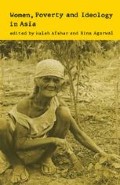Abstract
The debate on the relationship between the ideological and the material which has long occupied a primary place in Marxist scholarship is also one of central importance to feminist analysis.1 This book addresses some aspects of the debate in the context of Asia. In particular, it examines the role that ideology can play both as a disabling and an enabling factor in the lives of women seeking to earn a livelihood for themselves and their families under conditions of poverty. In many parts of Asia (especially in the South and West), for instance, prevailing traditional ideologies impose restrictions on women’s participation in income-generating work, by prescribing their confinement within circumscribed spaces, even while their economic situation necessitates such participation. Women caught in the poverty trap may then face conflicting choices between survival needs and social status and acceptability within the community. These choices can be particularly stark in communities where religion and culture dictate a high degree of physical seclusion and dependence for women, and where the State additionally reinforces traditional dictates, as in today’s Islamic theocracies. In contrast, elsewhere in Asia (as in much of South-East and parts of South Asia), the absence of such restrictions or the prevalence of traditional ideologies that favour female employment and autonomy, or State policies that counter the thrust of traditional restrictions, can complement women’s attempts at economic survival and advancement.
Access this chapter
Tax calculation will be finalised at checkout
Purchases are for personal use only
Preview
Unable to display preview. Download preview PDF.
References
Agarwal, Bina (1988) ‘Patriarchy and the “Modernising” State’, in Bina Agarwal (ed.), Structures of Patriarchy: State, Community and Household in Modernising Asia (Delhi: Kali for Women, and London: Zed Books).
Barrett, Michele (1980) Women’s Oppression Today: Problems in Marxist Feminist Analysis (London: Verso).
Joekes, Susan (1985) ‘Working for Lipstick? Male and Female Labour in the Clothing Industry in Morocco’, in Haleh Afshar (ed.), Women, Work and Ideology in the Third World (London and New York: Tavistock).
Mandelbaum, David G. (1988) Woman’s Seclusion and Men’s Honour: Sex Roles in North India, Bangladesh and Pakistan (Tucson: University of Arizona Press).
Mumtaz, Khawar and Farida Shaheed (1987) Women of Pakistan: Two Steps Forward, One Step Back (London: Zed Books).
Papanek, Hanna and Gail Minault (eds) (1982) Separate Worlds: Studies of Purdah in South Asia (Delhi: Chanakya Publications).
Editor information
Editors and Affiliations
Copyright information
© 1989 Haleh Afshar and Bina Agarwal
About this chapter
Cite this chapter
Afshar, H., Agarwal, B. (1989). Introduction. In: Afshar, H., Agarwal, B. (eds) Women, Poverty and Ideology in Asia. Palgrave Macmillan, London. https://doi.org/10.1007/978-1-349-20757-2_1
Download citation
DOI: https://doi.org/10.1007/978-1-349-20757-2_1
Publisher Name: Palgrave Macmillan, London
Print ISBN: 978-0-333-44409-2
Online ISBN: 978-1-349-20757-2
eBook Packages: Palgrave Social & Cultural Studies CollectionSocial Sciences (R0)

